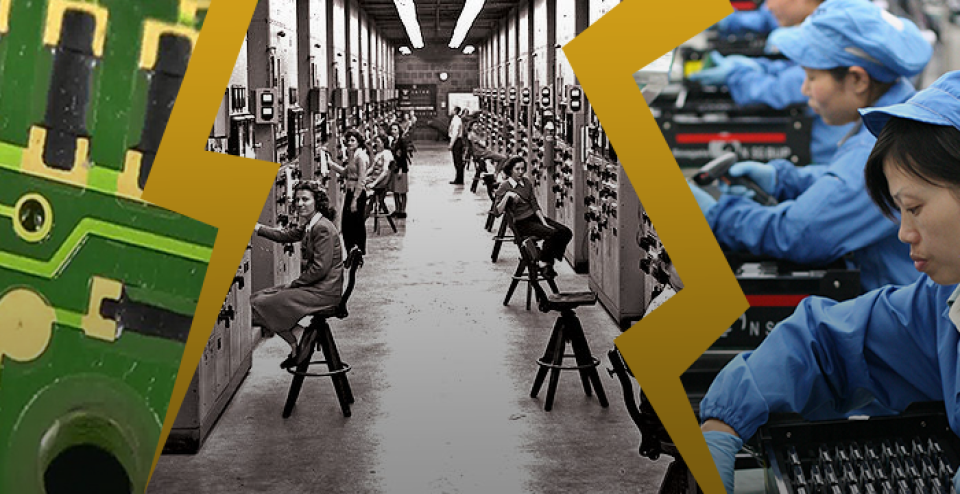
Article republished from Institute of Development Studies.
Insights from the AI Summit, London
It was in the spirit to understand how business might be viewing the issue that I recently visited one of the world's biggest Artificial Intelligence business conferences. I heard experts in insurance, healthcare, recruitment and back-office systems discuss the savings and efficiencies delivered by artificial intelligence. This experience added depth to the oft-cited statistics about potential job losses; one speaker told how his company was saving £1m a week by using 'robo-advisors'. Unlike humans, he explained, chatbots 'never get tired or impatient. They are always available and responsive'. I learnt that these systems are approaching parity with humans in speech recognition; meaning that they can transcribe speech almost as well as a professional.
This experience added depth to the oft-cited statistics about potential job losses; one speaker told how his company was saving £1m a week by using 'robo-advisors'. Unlike humans, he explained, chatbots 'never get tired or impatient. They are always available and responsive'.
A spokesman for one of the world's biggest computing companies spoke about how technological advances mean that we are on the verge of having computer systems that are not merely simplifying tasks; but are 'generally competent'; working alongside humans to reason, learn understand and collaborate. For example, AI teaching assistants are able to answer 40 per cent of queries they encounter; and fluent, natural conversational interfaces are on the 'near horizon'. A recruitment firm representative suggested that people in the labour market in developing countries could benefit from the opportunities presented by more sophisticated processing of big data from job applicants; with people in the Global South able to access employment opportunities previously denied to them.
Digitisation will hit developing countries hardest
It was hard not to feel excitement about the potential of these technologies to free people from boring, repetitive labour; but our focus at IDS is on the human impact and in particular what this means for people in developing countries, which will be hit hard by digitisation and automation. Our research for the recent Digital Development Summit showed that these challenges are potentially even greater for developing countries. Data from the World Bank show that susceptibility to automation is negatively correlated with gross domestic product (GDP) per capita: the poorer the country, the more susceptible it is.
It was hard not to feel excitement about the potential of these technologies to free people from boring, repetitive labour; but our focus at IDS is on the human impact and in particular what this means for people in developing countries, which will be hit hard by digitisation and automation.
This is exemplified by the story of the back-office jobs the guys at the AI conference - and they were mainly guys - were so excited about replacing with robots. For example, one million people in the Philippines are employed in the business process outsourcing (BPO) industry, delivering services such as back-office support, animation, software development and data transcription. This sector has also been an area where women have had an opportunity for economic advancement, accounting for 59 per cent of the workforce but 89 per cent of salaried call centre staff in the Philippines BPO sector are at high risk from automation. In India, 640,000 low-skilled back-office processing and IT support jobs are at risk.
Women face greatest effects – but seem invisible in debates on automation
The Philippines example reflects a broader trend; job losses from automation will not be experienced equally by men and women. Reflecting the marked persistence of gender gaps in labour markets in emerging economies, men stand to gain one job for every three jobs lost to technology advances, while women are expected to gain one job for every five or more jobs lost.
Women face greatest effects – but seem invisible in debates on automation.
But given that women are going to be hardest hit - they are almost invisible in the debates about automation. The discourse is dominated by headlines which warn us that 'artificial intelligence is pushing man and machine closer together' but what about women and machine? How can we ensure that women don't just start appearing in the debates, but also that women can benefit from the impacts of automation?
This relates partly to inequalities in women's access to and use of technology. As our partners in the Digital Development Summit, the Web Foundation, noted 'gender equality and female empowerment through ICTs, as proposed in Sustainable Development Goal 5b, will not become a reality until ICTs become more affordable and readily accessible to women.'
Back at the AI conference I quizzed the chief of robotics from a company specialising in automating the back-office roles currently performed by millions of women across Asia about this issue. He argued that education systems in countries like India needed to change to help people think laterally and creatively - that there could be new kinds of jobs available which require new skills. This could benefit women.
The chief of robotics in a company specialising in automation of back-office roles argued that education systems in countries like India needed to change to help people think laterally and creatively - that there could be new kinds of jobs available which require new skills. This could benefit women.
Research by my former colleagues at the Open University shows that BRIC countries have more women working in the IT sector than Western countries such as the US or UK. However unpaid care work (cooking, cleaning and looking after children and the elderly) is a significant barrier to progress on women’s economic empowerment. IDS research supports this and highlights the 'strong yet inverse link between the amount of time that women and girls spend on unpaid care work and their economic empowerment'.
Research highlights the 'strong yet inverse link between the amount of time that women and girls spend on unpaid care work and their economic empowerment'.
We need to act now, and fast
Unpaid care and a lack of digital access and skills are just two of the issues that we need to put on the table to get women into debates about automation. We also need to listen to multiple perspectives: our experiences at the Digital Development Summit showed the value of bringing together a range of stakeholders to understand how to mitigate the impacts of automation. If businesses profiting from automation aren't able to understand and mitigate the impacts of their activities we need social dialogue to hold them to account.
And for researchers? We need to act fast. The disruption of job automation goes way beyond call centres; agriculture, manufacturing and healthcare. We have a responsibility to learn about its potential impacts in all sectors and on all members of society.
Researchers need to act fast. The disruption of job automation goes way beyond call centres; agriculture, manufacturing and healthcare. We have a responsibility to learn about its potential impacts in all sectors and on all members of society.
Footnotes
Image of Y12 Calutron Operators from Wikimedia Commons, Seagate Wuxi China Factory Tour, photograph by Robert Scoble.
- 5543 views






Add new comment